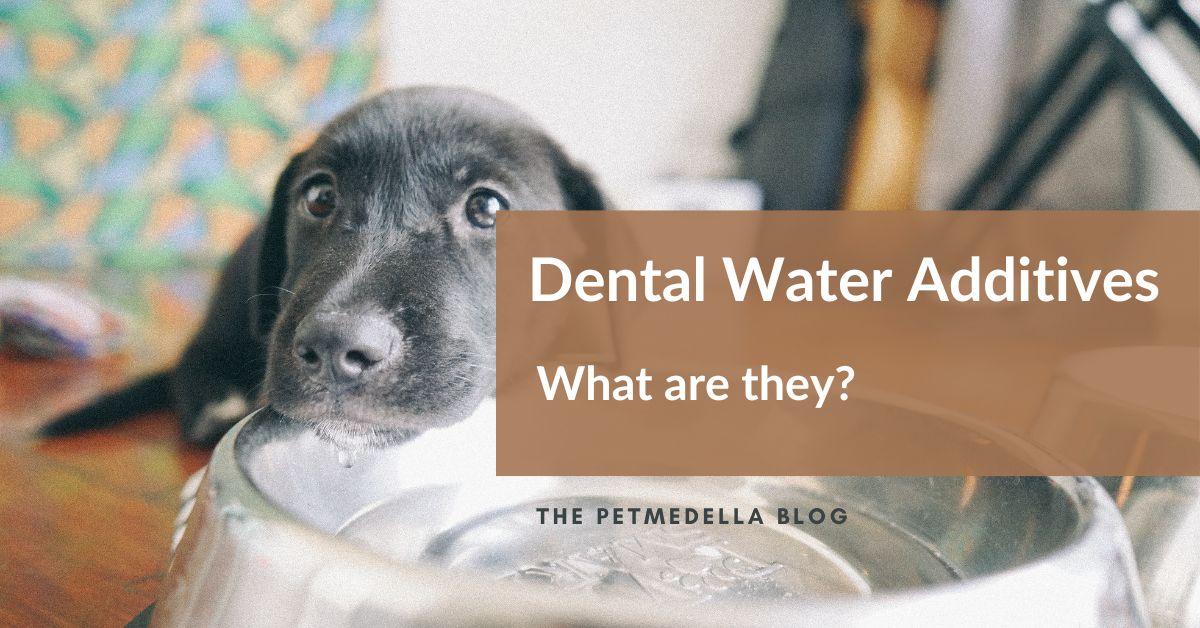
Understanding Dental Water Additives for Pets
You’ve probably seen, or even purchased, a dental water additive for pets. Moreover, you’re probably aware of the many responsibilities that come with caring for your furry friend including dental health for pets.
From proper nutrition and regular exercise to grooming and vet visits, the list of pet parent responsibilities extensive. Just like humans, pets also need to maintain good dental hygiene. This is where dental water additives for pets may come into play.
Dental water additives for pets are a relatively new concept in pet care, but they’re fast gaining popularity among pet owners. Simply put, these are substances you add to your pet’s drinking water to improve their dental health. Think of them as similar to the mouthwash that humans use, but specially designed for pets.
You might be wondering, “Why can’t I just brush my pet’s teeth?”
Our Practitioner Tanya Stricek, is a retired Dental Hygienist, and this is her first suggestion when caring for your pet’s mouth. Using a gently wash cloth and rubbing it over the gums disturbs biofilm, and massages gum tissue, while being gentle, if your pet hates the toothbrush.
While brushing is indeed an effective way to maintain your pet’s oral hygiene, it’s not always feasible. Some pets absolutely hate having their teeth brushed, making the process stressful for both of you.
This is where a dental water additive for pets can make a difference.
The Importance of Dental Health in Pets
Many pet owners underestimate the importance of dental health for their pets. Oral issues can lead to more serious health problems if left untreated, such as heart, liver, and kidney diseases. It’s also important to note that dental diseases can cause your pet discomfort and pain. And they can’t complain!
Cornell University College of Veterinary medicine shares that gum disease is one of the most common health issues for pets (1). They state that by 3 years of age, your dog may already have gum disease. This is a clear indication that dental health in pets is an issue that needs more attention. If your pet is resistant to toothbrushing, you may want to incorporate dental water additives for pets into a daily routine.
While it can’t replace brushing, it may help to prevent some oral diseases from developing.
Just as with humans, preventative care is the best approach when it comes to your pet’s dental health. Regular dental check-ups, a biologically appropriate diet, and daily dental care routines like brushing or using a dental water additives for pets can significantly reduce the risk of dental problems.

What are Dental Water Additives for Pets and How Do They Work?
Dental water additives for pets are solutions that you add to your pet’s drinking water with the aim of improving their dental health. They work by reducing the amount of biofilm, which is different that plaque and tartar build-up on your pet’s teeth. Biofilm is a congregate of microorganisms in a sticky substance that can cause inflamation in some people and pets.
Read more about biofilm in this CBH Energetics blog post.
These additives work in various ways. Some contain enzymes that help to break down the biofilm where bacteria thrive. Others contain chlorhexidine, an antiseptic that kills bacteria. And some others use a combination of these methods to provide a more comprehensive approach to dental care.
Remember, dental water additives for pets be supplemental to toothbrushing, and even proper hydration. Both of these alone will improve the overall dental hygiene of your pet.
Benefits of Using Dental Water Additives for Pets
One major benefit of using a dental water additives for pets is convenience. All you need to do is add the recommended amount to your pet’s drinking water. There’s no need to brush or apply anything directly to your pet’s teeth, which can be a stressful experience for both of you.
Another benefit is a possible elimination of bad breath. Feeding parsley and mint are also solutions for bad breath. According to Tanya, bad breath does come from less saliva, and from volatile compounds in the mouth itself, and even from food being left in the mouth after eating.
It is important to note that bad breath can be a very big sign of an underlying oral health issue. Always seek help from a licensed veterinarian if you suspect your pet has gum disease or a dental issue.
Types of Dental Water Additives for Pets Available in the Market
There are several types of dental water additives available in the market, each with its own unique formula. Some common types include enzyme-based additives, chlorhexidine-based additives, and those that use a combination of methods.
Enzyme-based additives use natural enzymes to break down the biofilm where bacteria live, thereby decreasing the amount of inflammatory bacteria in your pets mouth.
Chlorhexidine-based additives, on the other hand, use this antiseptic to kill bacteria in your pet’s mouth. Chlorhexidine is a powerful antimicrobial agent that’s often used in human and veterinary dentistry. We are curious to see how this might affect a pet’s gut health over time, as they are swallowing minute amounts over time. Usually, these products won’t make it past the stomach, into the small intestine.
There is no right or wrong answer, as each choice will be dependant on your pet’s needs.
How to Choose the Right Dental Water Additives for Pets
Choosing the right dental water additives for pets can be a daunting task, given the numerous options available. However, by keeping a few key factors in mind, you can make the right choice for your pet.
Firstly, consider your pet’s specific needs. If your pet has a serious plaque problem, for instance, an enzyme-based additive might be a good choice. If your pet has bad breath, an additive that targets bacteria could be more effective.
Secondly, look at the ingredients. Avoid additives that contain alcohol, as it can dry out your pet’s mouth and make dental problems worse. Also, avoid products with artificial colors and flavors, as these can cause allergic reactions in some pets.
Finally, consult with your vet. They can provide valuable guidance based on their knowledge of your pet’s health history and needs.
Steps to Use Dental Water Additives for Pets Effectively
Using dental water additives for pests is relatively straightforward. Here are some simple steps to help you use them effectively:
- Choose a high-quality dental water additive for pets that’s suitable specifically for your pet.
- Follow the instructions on the package to determine how much additive to use. Usually, you’ll need to add a certain amount of additive to each cup of water.
- Add the additive to your pet’s drinking water every day. It’s important to use the additive regularly for the best results.
- Monitor your pet’s reaction to the additive. If you notice any adverse effects, stop using the additive and consult with your vet.
- Remember to continue with regular brushing and vet check-ups. Dental water additives for pets should supplement, not replace, these practices.
Risks and Precautions When Using Dental Water Additives for Pets
While dental water additives for pets can be a great addition to your pet’s oral hygiene routine, it’s important to use them responsibly. Here are some risks and precautions to keep in mind:
- Some pets may be allergic to certain ingredients in dental water additives. Always monitor your pet’s reaction after introducing a new additive.
- Never use a human mouthwash as a substitute for a dental water additive for pets. Human mouthwash can contain ingredients that are harmful to pets.
- Always use the recommended amount of additive. Using too much can potentially harm your pet.
- Dental water additives for pets are not a cure-all for dental diseases. They should be used as part of a comprehensive dental care routine that includes regular brushing and vet check-ups.
Tips and Takeaways: Dental Water Additives for Pets and Oral Health
While dental water additives may play a role in maintaining your pet’s oral health, they should not take place of brushing, hydration, and a foundational nutrient dense diet.
They may have a limited role in preventing dental diseases, eliminating bad breath, and making your pet’s daily oral care routine easier.
Remember to choose a high-quality product that’s suitable for your pet and use it regularly for the best results. Consider diluting and using it as the “toothpaste” part of your pet’s oral care routine!
Sources:
https://www.vet.cornell.edu/departments-centers-and-institutes/riney-canine-health-center/canine-health-information/periodontal-disease#:~:text=Periodontal%20disease%20is%20one%20of,the%20incidence%20increases%20with%20age.
